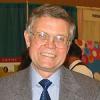Daniel Aaron is a Victor S. Thomas Professor of English and American Literature, Emeritus of English at Harvard University and a founder of the Library of America.He received his B.A. in 1933 from the |
 |
Karin is an entrepreneur, author, and an expert on start-up strategies. She is the co-author of Birthing the Elephant: The Woman’s Go For It! Guide to Overcoming the Big Challenges of Launching a Business (Ten |
 |
Bill Abbott
Westport, Conn.
|
 |
This article is excerpted from a book about historic Charleston houses by Shirley Abbott and the staff of Rebus, Inc., which will publish the volume later this year.
|
 |
Elie Abel (October 17, 1920 – July 22, 2004) wrote extensively on communism, politics, and history during his six decades as a journalist.
He led the New York Times' Belgrade office as bureau chief |
 |
Everett Is an undergraduate at Rice University, majoring in Mechanical Engineering and History. He currently works as the editor's intern.
|
 |
Penelope Muse Abernathy is the Knight Chair in Journalism and Digital Media Economics at the University of North Carolina’s School of Media and Journalism, and the author of the 2018 report, The Expanding News |
 |
Edward Abrahams, who lives in Washington, D.C., is the author of The Lyrical Left: Randolph Bourne, Alfred Stieglitz, and the Origins of Cultural Radicalism in America , which was published last year by the |
 |
—Ellen Abrams is writing a novel loosely about the Dionne quintuplets.
|
 |
Dean Acheson (1893-1971) was an attorney and statesman who served as Secretary of State from 1949 to 1953 under President Harry Truman. A key architect of the Truman Doctrine and the Marshall Plan, Acheson |
 |
Kenneth Ackerman is an author and attorney in Washington, D.C. He has written extensively on Gilded Age America, including in his books Boss Tweed: The Corrupt Pol Who Conceived the Soul of Modern New York and |
 |
Mr. Ackerman, who is Sunday editor of the New Bedford, Massachusetts, Standard-Times , is a long-time railroad buff, as well as “the only man who ever sailed backward up the Wareham River.”
|
 |
Stephen J. Ackerman is a freelance writer and a collector of American political memorabilia.
|
 |
Henry Adams is a Professor of American Art at Case Western Reserve University. A noted scholar of 19th century American Art, Adams has served as a curator at the Carnegie Museum of Art in Pittsburgh, as a |
 |
Scarritt Adams retired from the U.S. Navy as a Captain in 1960 after thirty years of distinguished service and subsequently was a lecturer in American history for the University of Maryland.
|
 |
Dick Adler lives in Los Angeles; he is a writer and editor for magazines and television.
|
 |
Adumbrator, The Old is member for American Heritage site since 2011. |
 |
Aiken, George D. is member for American Heritage site since 2011. |
 |
Aitken, Jonathan is member for American Heritage site since 2011. |
 |
Akin, Wallace E. is member for American Heritage site since 2011. |
 |
Daniel Akst is a writer whose work has appeared in the New York Times, Wall Street Journal, Los Angeles Times, Boston Globe, Slate and other leading publications. His most recent book is We Have Met the Enemy: |
 |
A journalist and former advertising executive, Robert C. Alberts was a Contributing Editor of American Heritage and wrote several books.
Alberts was primarily interested in 18th-century American history |
 |
Aldrich, August is member for American Heritage site since 2016. |
 |
Alexander, Jules is member for American Heritage site since 2011. |
 |
Dr. Alexander, who is chief of the Map Division of The New York Public Library, has particular interest in the cartography of the Age of Discovery.
|
 |
Frederick E. Allen is the Leadership Editor of Forbes.com. He was a long-time editor of American Heritage, and the Editor of Invention & Technology from 1984 to 2007.
|
 |
Richard Sanders Allen, postmaster of Round Lake, New York (population, 1,000), is an engineering historian. His specialty is covered bridges, but he has written on everything from colonial roads to pioneer |
 |
Ralph Gilmore Allen (1934–2004) was an American producer, director, writer, lyricist, and professor. He is credited, along with Harry Rigby with having conceived of the Tony Award-winning musical comedy Sugar |
 |
Gay Wilson Allen is the author of the 1981 Ralph Waldo Emerson , a Biography.
|
 |
Leslie Allen is independent writer and editor living in the Washington, D.C. area. She was a staff writer and editor at National Geographic from 1982 to 1992, and has authored two books, LIBERTY: THE STATUE |
 |
Frederick Allen is a former CNN commentator and the author of Secret Formula: A History of the Coca-Cola Company .
|
 |
The late Thomas B. Allen, a freelance writer in Bethesda, Maryland, was the author of Tories: Fighting for the King in America’s First Civil War (Harper 2010). Allen published articles on espionage and military |
 |
Gerald Allen is an architect and the author of Architectural Drawing: The Art and Process with Richard Oliver (Whitney Library of Design).
|
 |
Born in 1922, Oliver E. Allen was a Harvard graduate and a long-time editor and director of Time-Life Books.
|
 |
Patrick Allitt is the Cahoon Family Professor of American History at Emory University, specializing in political, religious, and intellectual history. Born in England, Allitt has written several books, |
 |
Jonathan Alter is an award-winning author, political analyst, documentary filmmaker, columnist, television producer and radio host. He is the author of three New York Times bestsellers, including The Center |
 |
Glenn C. Altschuler is the Thomas and Dorothy Litwin Professor of American Studies at Cornell and the author of All Shook Up: How Rock ’n’ Roll Changed America .
|
 |
Stephen E. Ambrose (1936-2002) was a historian and professor who wrote on military history, presidential history, and American expansion and foreign policy. Ambrose has been praised for his biographies of |
 |
Cleveland Amory (1917 – 1998) was a prominent author and animal-rights activist. Among his best-selling books included The Proper Bostonians , Home Town, and The Last Resorts and his popular series on " |
 |
—Kurt Andersen writes for The New Yorker , where his column, “The Culture Industry,” appears biweekly.
|
 |
Fred Andersen’s account of the making of the famous musical Yankee Doodle Dandy appeared in the July/August 1997 issue.
|
 |
Fred Anderson is an author and historian who has published many books on early modern colonial and military history. In 2006 Anderson completed The War That Made America: A Short History of the French and |
 |
Ross C. Anderson is chief curator of the Everson Museum of Art in Syracuse, New York. He has organized a retrospective exhibition of the art of Abbott Thayer, which will appear at the National Academy of |
 |
Peter Andrews is a contributing editor to American Heritage ; his story of how the U.S. forces in World War II learned their business the hard way in North Africa appeared in the December 1991 issue. |
 |
Wayne Andrews is Archives of American Art Professor at Wayne State University in Detroit. His next book, Architecture in New England , will be published by Stephen Greene Press in 1972.
|
 |
Ralph Andrist was a former editor in the Book Division of the American Heritage Publishing Company. He graduated with Magna Cum Laude with a major in journalism from University of Minnesota in 1935. He passed |
 |
After leaving his father’s grocery store, Paul McClelland Angle went on to Ohio’s Miami University, and subsequently became one of the nation’s foremost scholars of Abraham Lincoln and his times. The first of |
 |
Carl Sferrazza Anthony is an author who has written a dozen books on political families and wives, including America's First Families: 200 Years of Private Life in the White House, and Heads of State: The |
 |
Harvey Ardman, the author of several books, is writing a definitive history of the Normandie to commemorate the fiftieth anniversary of her launching.
|
 |
Armaleo, Maia is member for American Heritage site since 2011. |
 |


























